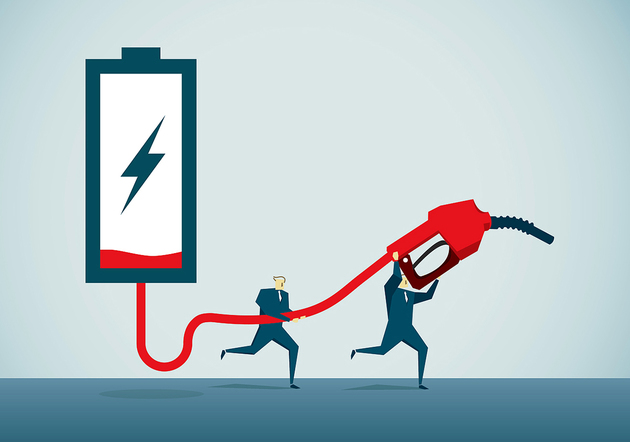
Photo/VCG
Apr. 24 (NBD) -- China's electric vehicle (EV) battery industry saw fierce competition this year, and a few industry giants grabbed increasing high EV battery capacity, a report said.
According to statistics from RealLi Research, a new-energy industry research institute, in March this year, 57 automakers pushed lithium-ion battery sales to 2.19 GWh.
Contemporary Amperex Technology Co Ltd (CATL) led the ranking of battery suppliers in terms of installed capacity, followed by BYD Auto and Guoxuan High-tech in turn. The capacity of CATL increased over three-fold to 1.1 GWh in March 2018 from 258.48 MWh a year ago, accounting for more than half of the entire lithium-ion battery sales. BYD Auto and Guoxuan High-tech sold 411.90 MWh and 193.64 MWh, respectively, in the month.
Among all types of batteries, lithium nickel manganese cobalt (Li-NMC) batteries dominated the market. Of the top 20 battery suppliers by installed capacity in March 2018, 17 provide Li-NMC batteries, with CATL and BYD grabbing over 70 percent of the market.
Besides, eight suppliers offer lithium-iron phosphate batteries and only one supplies lithium-ion manganese batteries. NBD noted that CATL and Guoxuan High-tech even made up 90 percent of the total installed capacity of lithium-iron phosphate batteries.
The EV battery capacity sold in the first quarter of 2018 registered 4.54 GWh, with a year-on-year rise of 182.67 percent, more than 80 percent of which are contributed by the top five companies.
Mo Ke, chief analyst of RealLi Research, noted that in the first quarter of 2018, the market share carved up by the top 20 companies surged from last year's 86.02 percent to over 97 percent, and other companies can only share less than 3 percent.
It is noted that the fast growth of CATL has caused pressure on other players. BYD, for example, was surpassed by CATL in the niche market last year. Though the Shenzhen-based company started its battery business earlier than CATL, its closed-loop supply chain in which the products were only applied on its own models created opportunities for CATL's rapid expansion.
In 2017, BYD witnessed a year-on-year decline of 30 percent in its power battery sales, the biggest drop in the past 3 years, as CATL reduced battery prices to grab the market.
To respond to the intense competition, BYD decided to transform its supply chain into an open one. On 31 March, 2018, Shen Xi, deputy general manager of lithium battery department of BYD, announced that the company is planning to spin off its power battery business, and the power battery unit is scheduled to get listed in 2022 or 2023.
In addition, BYD began to sell lithium-iron phosphate batteries to other auto makers.
The Li-NCM batteries will be sold to other enterprises as well, a staff member of BYD said to NBD.
Email: zhanglingxiao@nbd.com.cn


 川公网安备 51019002001991号
川公网安备 51019002001991号





